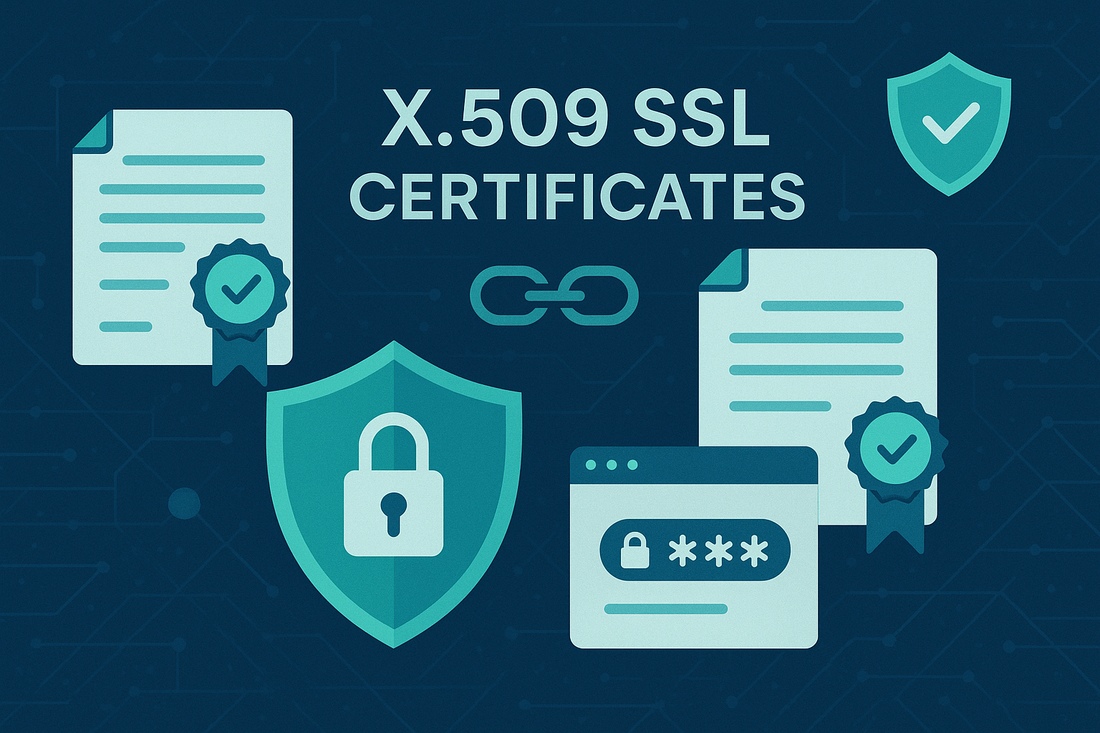
x.509 SSL Certificates
David ChenShare
X.509 SSL Certificates are the foundation of secure online communications, and Trustico® is a leading provider of both Trustico® and Sectigo® branded SSL Certificates.
Understanding how these critical security tools work is essential for organizations seeking to protect their digital assets and build customer trust.
What Are X.509 SSL Certificates?
X.509 SSL Certificates are standardized digital documents that enable secure connections between web browsers and servers.
Trustico® SSL Certificates use this format to provide robust encryption and authentication capabilities.
When you purchase a Trustico® SSL Certificate, it contains essential information including the domain name, organization details, and public key. This data is digitally signed by a trusted Certificate Authority (CA) to verify its authenticity.
The X.509 standard was first introduced in 1988 as part of the International Telecommunication Union's X.500 directory services standards.
Since then, it has evolved through multiple versions, with X.509 version 3 being the current implementation used in modern Trustico® SSL Certificates. This standardization ensures universal compatibility across different systems and platforms.
X.509 SSL Certificates follow a hierarchical trust model where Certificate Authorities (CA) like Sectigo® issue SSL Certificates that browsers and operating systems inherently trust.
This chain of trust is fundamental to secure internet communications, allowing your visitors to verify they're connecting to your legitimate website rather than an impostor.
The Technical Structure of X.509 SSL Certificates
Trustico® SSL Certificates follow the precise X.509 structure defined by RFC 5280. Each SSL Certificate contains a series of data fields encoded in ASN.1 (Abstract Syntax Notation One) format. This structured format ensures consistent interpretation across all systems that process the SSL Certificate.
The SSL Certificate version field in Trustico® SSL Certificates indicates which X.509 version is being used. Modern SSL Certificates use version 3, which supports critical extensions that enhance security and functionality beyond what was available in earlier versions.
Serial numbers uniquely identify each Trustico® SSL Certificate within a Certificate Authority's (CA) system. This unique identifier is essential for SSL Certificate management, revocation checking, and security auditing. No two SSL Certificates from the same CA will ever share a serial number.
Signature algorithm identifiers specify which cryptographic algorithm the Certificate Authority used to sign the Trustico® SSL Certificate. Modern SSL Certificates typically use algorithms like SHA-256 with RSA or ECDSA, providing strong cryptographic assurance of the SSL Certificate's authenticity.
How X.509 SSL Certificates Work
Trustico® SSL Certificates operate through a sophisticated system of public key infrastructure (PKI). When a user connects to your secured website, their browser automatically verifies the SSL Certificate validity and establishes an encrypted connection.
The encryption process uses advanced protocols to protect sensitive data transmission.
Trustico® offers various SSL Certificate types with different validation levels to match your security needs : Domain Validated (DV), Organization Validated (OV), and Extended Validation (EV).
When a visitor accesses your website secured with a Trustico® SSL Certificate, their browser initiates a process called the TLS handshake. This complex sequence begins with the client sending a "hello" message containing supported cryptographic algorithms. Your server responds with its selected algorithms and presents its Trustico® SSL Certificate.
The browser then validates the Trustico® SSL Certificate through several critical checks. It verifies the SSL Certificate hasn't expired, confirms it was issued by a trusted Certificate Authority (CA), checks that it hasn't been revoked, and ensures it was issued specifically for your domain name. If any of these checks fail, the browser displays warning messages to the user.
After successful validation, the browser uses the public key from your Trustico® SSL Certificate to establish a secure session key. This session key enables encrypted communication between the browser and server, protecting all data exchanged during the session. This encryption ensures that sensitive information like login credentials, personal details, and payment information remains secure from eavesdropping.
Key Components of X.509 SSL Certificates
Every Trustico® SSL Certificate contains several crucial elements that ensure secure communications. These include the subject name, issuer information, validity period, and public key details.
Our SSL Certificates use industry-standard X.509 version 3 format, supporting modern encryption algorithms and security features. This ensures maximum compatibility with all major browsers and platforms.
The subject field in your Trustico® SSL Certificate identifies who the SSL Certificate was issued to.
For Domain Validation (DV) SSL Certificates, this includes the domain name.
Organization Validation (OV) and Extended Validation (EV) SSL Certificates include additional verified information about your organization, such as legal name, location, and registration details.
The issuer field identifies which Certificate Authority (CA) issued and signed your Trustico® SSL Certificate. This creates the chain of trust that browsers use to verify SSL Certificate authenticity.
Trustico® SSL Certificates are backed by trusted authorities like Sectigo® which ensures broad recognition and acceptance.
Validity periods define exactly when your Trustico® SSL Certificate is considered valid, with precise start and end dates. Modern industry standards limit SSL Certificate lifespans to a maximum of 398 days, requiring regular renewal to maintain security.
Trustico® provides timely renewal reminders to ensure continuous protection.
The Subject Alternative Name (SAN) extension allows a single Trustico® SSL Certificate to secure multiple domain names. This extension is essential for Multi-Domain SSL Certificates and is how modern browsers determine which domains the SSL Certificate legitimately covers.
X.509 Certificate Extensions
Certificate extensions in X.509 provide additional functionality and security controls beyond the basic SSL Certificate fields. Trustico® SSL Certificates implement several critical extensions that enhance their security and utility in modern web environments.
The Basic Constraints extension identifies whether a SSL Certificate can be used as a Certificate Authority. For standard Trustico® SSL Certificates issued to websites, this is set to "false" to prevent the SSL Certificate from being used to issue others, which would be a significant security risk.
Key Usage and Extended Key Usage extensions specify exactly what purposes the SSL Certificate's public key can be used for. Trustico® SSL Certificates for websites typically have these set to allow server authentication but restrict other uses, providing precise security controls.
Policies extensions contain identifiers that indicate which policy the SSL Certificate Authority (CA) followed when issuing your Trustico® SSL Certificate.
For Extended Validation (EV) SSL Certificates, this includes specific policy identifiers that browsers recognize to display enhanced visual trust indicators.
Authority Information Access (AIA) extension provides locations where additional information about the SSL Certificate issuer can be found. This includes OCSP (Online Certificate Status Protocol) endpoints that browsers can query to check if your Trustico® SSL Certificate has been revoked.
Benefits of Trustico® SSL Certificates
Organizations choosing Trustico® SSL Certificates gain multiple advantages. Our SSL Certificates provide robust 256-bit encryption, protecting sensitive data from unauthorized access and interception.
Trustico® offers both single-domain and multi-domain SSL Certificate options. Our wildcard SSL Certificates secure unlimited subdomains, providing cost-effective protection for larger websites.
All Trustico® SSL Certificates include features like unlimited server licensing, free reissues, and dedicated support. We also provide user-friendly management portals for SSL Certificate monitoring and renewal.
Trustico® SSL Certificates support Perfect Forward Secrecy (PFS), an advanced security feature that generates unique encryption keys for each session. This ensures that even if a private key is compromised in the future, past communications remain secure. This additional layer of protection is particularly valuable for organizations handling sensitive customer data.
Certificate Transparency (CT) logging is included with all Trustico® SSL Certificates. This security mechanism records all issued SSL Certificates in public, verifiable logs, helping to detect unauthorized SSL Certificates and prevent man-in-the-middle attacks. CT logging has become an essential component of the modern web's trust infrastructure.
Implementation and Management
Installing Trustico® SSL Certificates is straightforward when following the relevant installation guides provided on our website.
We send timely renewal reminders and provide instant reissuance capabilities to prevent SSL Certificate expiration issues.
Proper SSL Certificate chain installation is critical for optimal compatibility across all client devices. We provide complete chains with all SSL Certificates, along with detailed instructions for configuring intermediates. This ensures visitors receive the complete trust path needed for proper validation.
Private key security represents one of the most critical aspects of SSL Certificate implementation. Trustico® recommends generating keys with sufficient strength (minimum 2048-bit RSA or equivalent ECC) and implementing strict access controls to protect these sensitive cryptographic assets.
Certificate revocation mechanisms like OCSP and CRL (Certificate Revocation Lists) should be properly configured on servers using Trustico® SSL Certificates. These mechanisms allow browsers to check if a SSL Certificate has been revoked due to compromise or other security concerns. Trustico® SSL Certificates include properly configured revocation information to ensure optimal security.
Advanced X.509 Features in Trustico® SSL Certificates
Modern Trustico® SSL Certificates support OCSP Stapling, an efficiency enhancement that improves performance and privacy. With OCSP Stapling, your server periodically obtains a time-stamped OCSP response from the Certificate Authority and includes it in the TLS handshake. This eliminates the need for browsers to make separate OCSP requests, speeding up connection times while maintaining security.
Certificate Transparency (CT) Precertificates are used in the issuance process for Trustico® SSL Certificates. This mechanism allows SSL Certificates to be logged in CT logs before final issuance, ensuring compliance with browser requirements. The SCTs (Signed Certificate Timestamps) proving this logging are embedded directly in your SSL Certificate or delivered via OCSP stapling or TLS extensions.
Name Constraints extensions can be implemented in specialized enterprise scenarios to restrict which domains a subordinate CA can issue SSL Certificates for. While not typically used in standard website SSL Certificates, this advanced X.509 feature provides additional security controls for organizations with complex PKI requirements.
Extended Key Usage constraints in Trustico® SSL Certificates precisely define what the SSL Certificate can be used for. Website SSL Certificates include the "serverAuth" (TLS Web Server Authentication) purpose, while other specialized SSL Certificates might include different purposes like "clientAuth" for client authentication or "emailProtection" for secure e-mail.
Choosing the Right SSL Certificate
Trustico® helps organizations select appropriate SSL Certificates based on their specific needs. Whether you require basic Domain Validation (DV) or full Extended Validation (EV), we offer suitable solutions.
Our SSL Certificate experts provide personalized guidance to ensure you get the right level of protection. We offer both Trustico® branded and Sectigo® branded SSL Certificates to meet diverse requirements and budgets.
When selecting an X.509 SSL Certificate, consider the specific validation level appropriate for your organization.
Domain Validation (DV) SSL Certificates verify only domain ownership and are suitable for blogs, informational sites, and testing environments.
Organization Validation (OV) SSL Certificates verify business legitimacy and are ideal for commercial websites.
Extended Validation (EV) SSL Certificates provide the highest level of validation and visual trust indicators, making them perfect for financial services, e-commerce, and healthcare organizations.
Key algorithm selection is another important consideration. Trustico® SSL Certificates support both RSA and ECC (Elliptic Curve Cryptography) algorithms. While RSA remains widely compatible, ECC provides equivalent security with smaller key sizes and better performance. For most modern websites, we recommend ECC SSL Certificates where compatible with your infrastructure.
Security and Compliance
Trustico® SSL Certificates meet all industry standards and compliance requirements.
Our SSL Certificates are compatible with major browsers and provide visual trust indicators that boost customer confidence.
Regular security audits and updates ensure our SSL Certificates maintain the highest levels of protection. We continuously monitor industry developments to provide cutting-edge security solutions.
The CA/Browser Forum Baseline Requirements govern the issuance of all publicly trusted X.509 SSL Certificates. Trustico® and our Certificate Authority (CA) partners strictly adhere to these requirements, ensuring our SSL Certificates meet the security standards required by all major browsers and operating systems.
PCI DSS compliance requires the use of strong encryption for cardholder data transmission. Trustico® SSL Certificates provide the necessary TLS encryption to help meet these requirements. For e-commerce websites and payment processors, implementing proper X.509 SSL Certificates is an essential component of PCI compliance.
GDPR and other privacy regulations increasingly require appropriate technical measures to protect personal data. Trustico® SSL Certificates provide the encryption necessary to protect data in transit, helping organizations meet their legal obligations for data protection and privacy.
The Future of X.509 SSL Certificates
The X.509 SSL Certificate ecosystem continues to evolve with advancing security requirements. Trustico® stays at the forefront of these developments, ensuring our SSL Certificates implement the latest security enhancements and comply with emerging standards.
SSL Certificate lifespans have been progressively shortened to enhance security. What was once a standard 3 year validity period has been reduced to a maximum of 398 days. This trend is likely to continue.
Post-quantum cryptography represents the next major evolution in SSL Certificate security. As quantum computing advances threaten traditional cryptographic algorithms, new quantum-resistant algorithms are being developed.
As industry discovers and adapts to new challenges we will transition and provide transition guidance as these new algorithms become standardized and implemented in X.509 SSL Certificates.
Automation standards like ACME (Automated Certificate Management Environment) are streamlining SSL Certificate issuance and renewal processes.
Trustico® is embracing these automation technologies to provide more efficient SSL Certificate management solutions, reducing administrative overhead and helping prevent security lapses due to expired SSL Certificates.
Getting Started with Trustico® X.509 SSL Certificates
Implementing X.509 SSL Certificates for your organization begins with assessing your specific security requirements and technical environment.
Contact us today to discuss your X.509 SSL Certificate requirements. Our team will guide you through the selection, validation, and implementation process to ensure your digital assets receive the protection they deserve.
Trust Trustico® to provide the X.509 SSL Certificate expertise and solutions your organization needs to maintain security, compliance, and customer confidence in today's challenging digital landscape.



